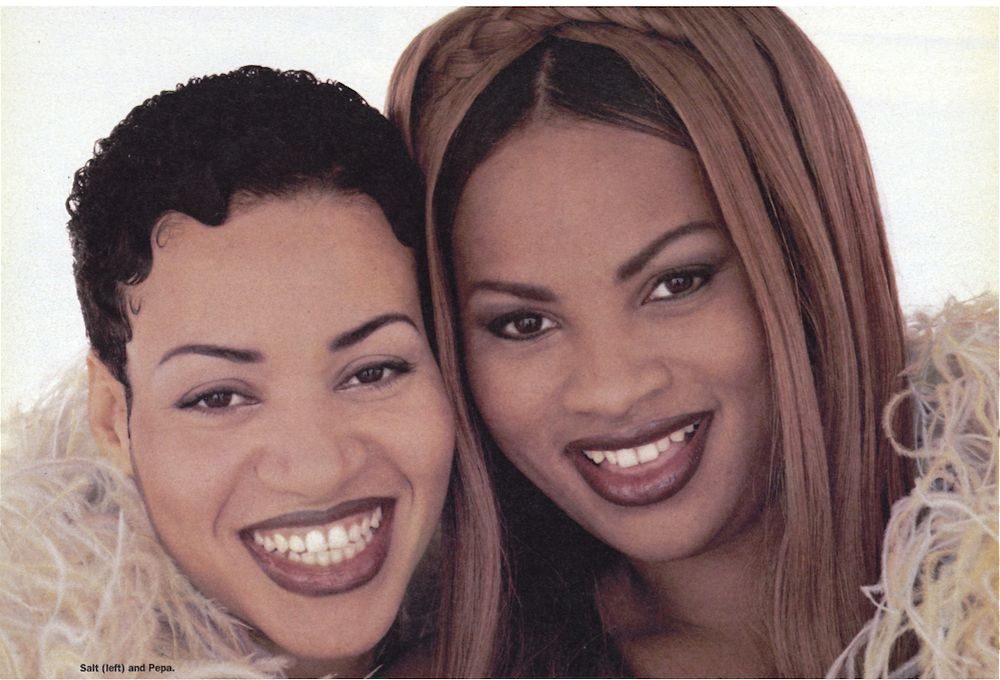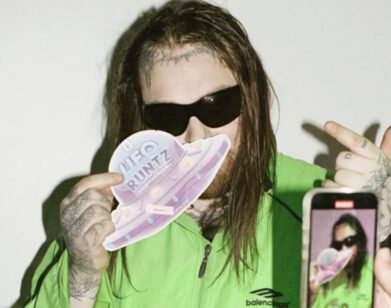New Again: Salt-N-Pepa
No discussion of late ’80s or early ’90s pop culture is complete without paying homage to Salt-N-Pepa, otherwise known as Cheryl “Salt” James, Sandi “Pepa” Denton, and DJ Deidra “Spinderella” Roper. Hailing from Queens and Brooklyn, the Salt-N-Pepa ladies burst onto the music scene in 1985 and created a place for women in hip-hop and rap with iconic songs like “Push It” or “Let’s Talk About Sex.” Plus, as if their songs weren’t candid and empowering enough, Salt-N-Pepa could always be counted on to churn out boundary-breaking music videos (writhing around in a mud bath in “None of Your Business” comes to mind). Though we can’t think of anyone who can rock Lycra body suits better than the Salt-N-Pepa ladies could, they were—refreshingly—never exploitative about their sexuality and liberation. Whether they were self-promoting in matching jackets or crafting big beats with feminist rhymes, the ladies turned the male-dominated world of rap upside down and pioneered the genre’s crossover into mainstream acceptance.
Luckily for us, Salt-N-Pepa has shown no signs of slowing down. After disbanding briefly from 2002 to 2007, the group has since been seen on VH1 in two seasons of The Salt-N-Pepa Show and headlined a 2011 national tour titled Salt-N-Pepa’s Legends of Hip Hop Tour. In June and July of this year, the group is touring in the US and UK, so we dug into the Interview/Salt-N-Pepa repository to soothe our Golden Age of Hip Hop nostalgia.
1995 was a big year for the group—in March, they won the Grammy for Best Rap Performance by a Duo or Group with “None of Your Business” (the first female rappers to do so), which cemented their place in the upper echelons of the genre. Several months later, in our October 1995 issue, founding members James and Denton spoke with Mary Wilson of The Supremes about owning their sexuality, not drawing a distinction between hip-hop and rap, and refusing to let fame go to their heads. —Adrian Rapazzini
Salt-N-Pepa’s Unshakeable Conviction
By Mary Wilson
Beyond a doubt—and beyond all their hits and awards—Salt-N-Pepa have proved that they’ve got the spice it takes to produce songs and videos that won’t kowtow to anyone or anything. Well, they’re at it again this month with their title track to the compilation album Ain’t Nuthin’ but a She Thing (London Records). And although any time would have seemed right to us to talk to the group’s two outspoken leaders, known as Salt and Pepa, right now seemed perfect. It’s a time when being outspoken, intelligent, respectful of others’ differences, and unwavering is all too rare—and all those things are just what Salt and Pepa are. Of course, every band has those groups and individuals who’ve helped pave the way for them. To us, there was one band who fit this description for Salt-N-Pepa supremely. Who better to pop the questions than Mary Wilson, one of the founding members of the Supremes.
MARY WILSON: Maybe I should start this conversation by asking about your new song and he concept for your new video, which Interview just sent me.
CHERYL JAMES [SALT]: The album was created by different female artists who all contributed songs [like Melissa Etheridge, Annie Lennox, Patti Smith, Queen Latifah, Sinead O’Connor, Vanessa Williams with Me’Shell Ndegéocello, and groups like Come and Luscious Jackson]. The proceeds from the album are going to women’s organizations [through the Shirley Divers Foundation for Women] that deal with things like physical and sexual abuse against women, AIDS, breast cancer, and many other things. When they asked us if we wanted to be down with the project, we were trying to think of a song we could do for it. I asked the organization is we could just use “Ain’t Nuthin’ but a She Thing” for the title of our song and they said sure. We ended up shooting a video for it with Ellen von Unwerth, which looks very different from anything we’ve ever done before. The song is about how this ain’t a man’s world. How, if you put your mind to it and believe in yourself, you can accomplish anything that a man can.
WILSON: I don’t know if you guys have read my book Supreme Faith, but I was in an abusive situation. And I wrote a lot about what that was like. Thank God we’re friends now, but I can remember in my situation I would call for help and nobody would come. The courts and the policeman said, “Well, that’s a civil thing.”
JAMES: Almost like it was acceptable.
WILSON: Yeah. And it’s nice that now women are beginning to talk about it, because it’s amazing how much of it still goes on. In your video you actually show women who are more powerful than men, who are in control, and who fight back.
JAMES: I remember this women’s rally I went to. One of the speakers asked how many women had been harassed or abused sexually in their life? There were thousands of women in the audience, and almost every one of them raised her hand. It was unbelievable. But a lot of women who are in abusive situations are frightened and scared because they feel threatened. I think the key to changing the kind of abuse and inequality women have had to live with is that we have to talk about it with one another, and be there for one another and support one another. Because it’s the not talking about it that makes it able to happen. Women have to get over that fear.
WILSON: So now that you’re in a position to do things like this album, I’m wondering how you feel about that kind of responsibility. Because, like you, I also do a lot of work on behalf of AIDS organizations and in the fight against sexual abuse. And I’m a spokeswoman fro the Susan G. Komen Breast Cancer Foundation and am involved with gun control. But I remember, when the Supremes started out, hardly any singers were involved in social causes or even product endorsements, and we were one of the first groups to start doing those types of things. On the one hand, we endorsed products like Coca-Cola and Arid. But we also endorsed the Heart Association. Later we got involved in some politics. We endorsed Hubert Humphrey [in the 1968 Presidential race against Richard Nixon]. And as we started getting involved in the things we believed in, I realized, God, being in the position I’m in makes me able to do things more of what I want to do as an individual. Not for the money, but because you care about something.
JAMES: I guess it’s like that with Salt-N-Pepa. We have a strong following that ranges from little kids to adults. A lot of people approach us to endorse things—like a certain brand of beer or whatever. Even if we might, you know, have a beer every now and then [laughs], we would never endorse a product like that, tell people, “This is the way to go.” We would turn that kind of endorsement down, no matter what the money was.
SANDI DENTON [PEPA]: Because people look up to us. Teenagers look up to us. We all have little sisters and cousins who look up to us, and we see what they go through. So we have to be an example. A lot of artists come into this business and they don’t see things that way. But as you get older—and now that we also have children—your conscience starts working on you. You have to give your fans and your children something they can use in life.
WILSON: So you both have children?
JAMES: All three members of the group do.
WILSON: But there are only two of you on the phone, right?
JAMES: Yeah. [laughs] Sandi and my lives have been crossed, but there’s a third member of Salt-N-Pepa called Spinderella [Deidra Roper].
WILSON: How old are your children?
DENTON: My son is five years old. His name is Tyran.
JAMES: My daughter, Kerrin, is four. And Spinderella’s daughter, Christi, is three.
WILSON: I didn’t start having my children until I was thirty. By that time, the Supremes had—well, we hadn’t disbanded, but Diane [Diana Ross] had left. I was trying to hold the group together and I found it really hard, because at one point I had three children on the road and my mother and my husband and my adopted son. It was like a little circus. [laughter] This was also the time when the hits had slowed down. I want to ask you a question related to that. You’re on top today. I don’t think anybody can touch you. And I know what that feeling is like. It’s a wonderful feeling.
JAMES: Well, we’re on top because of people like you that were here before us.
WILSON: There’s always somebody who help pave the way. We had people like Lena Horne, Sammy Davis, Jr., Dorothy Dandridge, and Ethel Waters. There were many who had it really, really rough and broke down barriers for us. Then we came up and we broke down some barriers. Now you’ve come along and you’re breaking down more barriers. But sometimes when you’re in that kind of position that you guys are in now, people kiss your butt, your feet, your toes, your corns, your eyelashes, your false eyelashes—whatever you’ve got, because you’re on top and you’re making those people money. I know you guys have your heads on straight. But having been in the same position, and knowing what the ups and downs can be like—because, believe me, I’ve certainly been through my share of ups and downs—I just wanted to ask you how you feel about where you are now.
JAMES: I’ve seen so many people go up and come down just as fast, and you never know when you’re not going to be doing so good. So we’ve never let it go to our heads. Pepa looks in the mirror every day and goes, “Wow, I’m Pepa. People all over the world know me. How did I get chosen to be this famous?” [laughs] On the business end, what Salt-N-Pepa is trying to do now is get behind the scenes, because, you know, it doesn’t last forever. There’s going to come a point in my life where I’m probably not going to want to make records anymore. And I’m going to want to have an option. We have our own record label [Jireh Records]. We’re concentrating on the publishing and the writing and the producing and putting out other groups and stuff like that. So that one day I can say, “I quit,” if I want to. Because it’s hard, especially when you have kids. And I want to have more kids. I want to be able to chill at home and not have to travel all the time.
WILSON: Yes. You don’t want to do so much now, and then later in your life have to need to work. Because if you reach my age, 51, and you have to go back on the road and you really don’t want to, you’ll be pissed [laughs]. This is hard for me to say, and I’ll say it now, since I’ve finally got a record deal. No one wanted to sign me. In certain people’s eyes, I guess I was like a has-been. I don’t know why, because I’m a star in my mind and always have been.
JAMES: Go, girl.
WILSON: But I found out that once the Supremes disbanded and I went out on my own, people did not want to listen. You know, I thought the Supremes were going to go on forever. When Diane left the group, it took me a while to realize that she had to go and do her own thing. After I got over the hurt, I also realized, Heck, now I can work on me. I don’t have to worry about—
JAMES: —being part of somebody else.
WILSON: Yes.
DENTON: Are you and Diane still friends?
WILSON: Well, that’s a good question, because it brings up something I wanted to discuss with you guys, which is what it takes to stay together. The first time I met Diane, it was like seeing the other part of me, the inside of me that no one knew. I know that on the inside Diane is very sincere and vulnerable, although on the outside she seems very aggressive. So we kind of flip-flop. Like what you were saying earlier about your lives being crossed. Diane and I probably love each other equally, but the business got in the way. There were a lot of things I didn’t understand. What happened wasn’t her fault, and it wasn’t my fault. One day, hopefully, we’ll be able to get together. It is seemingly doubtful, but I don’t know there’s anybody who can love her more than I do.
DENTON: That’s good to hear, because people break up under such terrible circumstances. And being in a group is almost like being in a marriage, you know.
WILSON: Not almost. It is [laughs].
JAMES: And even in a marriage, people strive to keep their identity and their own individuality. It’s all about understanding. You have to constantly put yourself in another person’s shoes to see what they’re thinking or feeling or why they might have said something you don’t understand. That’s what me and Pepa have learned over the years.
WILSON: How old were you girls when you started?
JAMES: Sandi was 20, I was 19, and Spinderella was 16.
WILSON: You were a little older than us. We were all 13 when we started singing together. When you start out that young, you realize very quickly that in any group situation you have to allow others to have their own opinions, their own likes and dislikes, and to do their own thing.
[Someone calls Denton on the other line.]
JAMES: Do you have to go, Sandi?
DENTON: Yeah. I’m getting ready to open a store in Atlanta. So I have all these meetings set up today.
[Denton says goodbye.]
JAMES: Talking of doing your own thing, Sandi’s opening up her own clothing store [Hollyhood] and she’s real excited about it.
WILSON: It’s healthy when you each have your own interests. [pause] Let me see. My best friend wanted me to ask you a question. She said, “Talk to them about the difference in style between the Supremes and Salt-N-Pepa.” You girls look the way we would have loved to have been able to look—like sexy women. [laughs] I find the women of today are much more assertive and sure of themselves than we were. In fact, we allowed ourselves to be directed by the men. But the one thing we were assertive about was singing, and being glamorous. Is that assertive, sexy image of Salt-N-Pepa a conscious choice or did it just evolve because that’s the way you are?
JAMES: Basically, everything just fell into place because of the way we are. Sometimes we like to be glamorous, and sometimes we just feel like getting raw and sexy. When we came out with our song, “Shoop,” which was the first song we released after we all had kids, we were all a little overweight. We’re still not model size. You know, we look like real women. And in that song we were talking about our sexuality and how we like men. That was different for us, and I think that’s when people started looking at us differently. When we get raw and sexy some people say, “Why do you have to go there?” I feel like, as long as you’re letting the world know that you’re intelligent and you’re to be respected and you have a mind of your own and you’re taking care of business, ain’t nothing wrong with showing off what you got, especially when you work out almost every day to get it. Of course, you have to show it with taste and with class. It’s about having an attitude of your own.
WILSON: And being a pioneer. You guys are pioneers in rap—or is it hip-hop that you do?
JAMES: It’s all the same. But sometimes people don’t know what to call us, because we’re so daring and we don’t follow anybody’s agenda. We have our own agenda. That’s part of the reason we’ve been so successful. I feel that’s what you guys did, too.
WILSON: Yeah. We made the statement first, and everybody else followed.
JAMES: That’s right. It was like, “Yes, this is who we are, and we’re not following somebody else’s rules.” That’s what I always admired about you guys. And I think that’s really the similarity between Salt-N-Pepa and the Supremes. I’m sure glad you all got a lot of flak about being divas and—
WILSON: Oh yeah. [laughs]
JAMES: But that’s why you all reached the top.
WILSON: Do you consider yourselves feminists?
JAMES: I think we’re feminists to a certain degree. But I have no problem with the man being the man, as long as the man knows how to be a man.
WILSON: There’s that saying, “Behind every man there’s a great woman.” I came up with my own version of that statement: “Alongside every man, there’s a great woman.”
JAMES: That’s right. Like my pastor always says, “We were taken from the rib. And the rib is on the side, it’s not in the back.”
WILSON: Bless you. Listen, I’m real pleased to have talked with you.
JAMES: It’s been an honor. I mean, I was gagging when they told me I was going to talk to Mary Wilson. I love you so much. Maybe you could come out with us sometime to this little jazz club we go to in New York.
WILSON: I’ve love that. In the meantime, I got to get started on my album. I am so scared.
JAMES: O.K. I’ll pray for you. You go, girl.
THIS ARTICLE INTIALLY APPEARED IN THE OCTOBER 1995 ISSUE OF INTERVIEW.
New Again runs every Wednesday. For more, click here.







